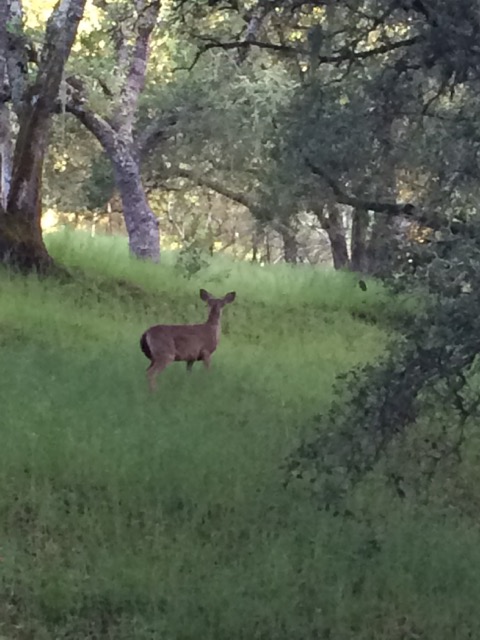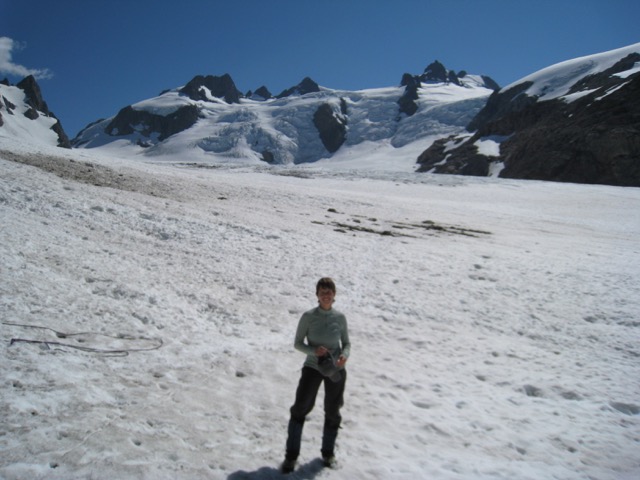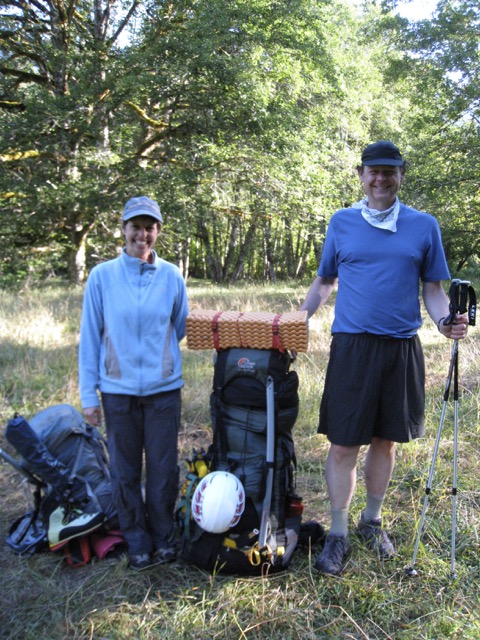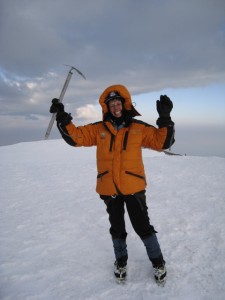There are no lights outside the Chief’s House, and Lesley and I follow David carefully up the uneven stone stairs to the grassy area (which I’d been eyeing jealously as a comfortable meditation spot) and around to the back of the house. It’s late at night, but the fog which had rolled in with the evening’s wind makes the darkness seem lighter somehow. Perhaps particles of starlight, colliding with particles of water, become diffused in the atmosphere, illuminating the darkness with infinite drops of fluorescent fog.
The cypresses wave and creak behind us, and I wonder if our Great-horned owls are watching us from the canopies, eyes yellow and bright, penetrating the shadows with ease. Raptor eyes, they had followed and hunted countless scurrying beasts like us in the mad scramble on the ground from one place of safety to the next. The inner mouse in me quakes at the thought of them taking off on their silent wings, gliding above us. Are they scrutinizing us, establishing our general height and weight, determining if they could — perhaps together? — grasp one of us in their claws and….
I know David’s been in the Chief’s House many times, but our quiet stumble and tiptoe to the back door seems somehow stealthy and clandestine, as though we are breaking in somewhere we’re not allowed. We seem to me, in fact, not much different from the two musicians in Some Like It Hot as they walk-crouch near the wall, covering themselves with their instruments, trying to seem inconspicuous as they run away from the police trap. I am carrying David’s violin, and he is carrying his mandolin and a guitar, so the reference is not quite as far-fetched as it would seem.
“The front door key doesn’t work,” David explains.
I am not surprised. I wouldn’t be surprised, in fact, if in order to get in David lifted a rock and broke the window in the back door, threaded his arm through the broken fragments, and opened the lock from the inside. My breath hitches, but David does not lift a rock. He pulls out a key, and the door swings open without a squeak or a groan.
The three artists who had stayed in the house for the past week had left earlier that day. I’d watched them in the days since we arrived at the Boathouse, a peek here and there, as they wandered the grounds. One carried a camera with a big lens. Another, young, had come to listen to a lecture and had stayed for lunch with us. The third I often saw near the docks where I meditated in the mornings. We, aspiring California Naturalists, had left them be. They had come to spend the week in retreat with the intention of growing creative and inspired, becoming nourished by sea and sand and wind. Now they’d gone home, perhaps to turn the inspiration into essays and poems, paintings, photographs, eternal works of art or books.
The house towers above us, windows tall and unlit. David puts two instrument cases down, reaches for his violin, and holds the door open for us. Lesley and I tramp in and find ourselves inside a small mudroom which opens to a kitchen and a spacious dining room beyond. The kitchen has white cabinets, old and crooked. No table or chairs. A refrigerator hums in the corner. It reminds me of my grandmother’s kitchen when she lived in her old house in Tel Aviv. To my surprise, the rest of the house is beautifully furnished. I had expected it to look sparse, having heard from David that he had scrounged every single item himself from people he knows or at the office. I should have known better. This is David, after all, and the house is, therefore, lovingly decorated with attention to detail and comfort. There are paintings on the wall, apples in a bowl on a side table, and knick-knacks, suitably ocean-themed. David proudly leads us to a sitting room, the most beautiful room in the house, he says. He showcases the front porch and a window, from which, he says, we could see Drake’s Bay in the morning.
We follow David up the stairs to see the three bedrooms. None has a bathroom attached. The bathroom is downstairs, David tells us, and there is another one in the basement, but the basement had not been cleaned out yet.
“We could fit twelve people in here,” he says.
I wonder how. The beds are easily recognizable as halved bunk beds, perhaps from the Boathouse. One of the rooms, which both Lesley and David declare as their favorite, is so tiny as to be more like a monk’s cell than a room. I wonder what it’s like to walk downstairs in the middle of the night to use the bathroom, to sleep in this haunted, groaning old house. What is it like to sleep in a house with a cellar which may still have remnants of inhabitants dead long ago, spider-webbed furniture, old photos strewn near a clothes chest that smells powerfully of dust?
Downstairs, Lesley and I settle on the sofa. I drag the ottoman toward us, and we both put our feet on it. David sits across from us near the dining table and brings out, in order, his mandolin, guitar, and violin. He plays and sings. The dining room is cheery, and David’s voice fills the silence of the house with a lively song. David wrote the words and the music to all the songs he’s singing for us, real and fantasy stories about his experiences mixed with commentary and dialog.
I don’t dance, but I wish I could. I let myself merge with the music, the old house, the nearness of new friends, the cypresses waving in the wind outside. Only one and a half days are left in the class, and my mind and body are tired. Tired of not sleeping well, tired of being in close proximity with other people, of filling my head full of facts and names of things. I am happy to surrender to the sound of David’s music, to the notes twirling around the room in a jiggy dance. The house creaks gently. Rob, our cook’s partner, comes in and settles in a chair across from us. Later, the next day, I’ll discover he’s a backpacker, and my interest in talking to him will unfurl, but for now I am ready to leave and allow him to stay with David and talk about whatever it is men talk. Lesley and I make our way back around the house and under the cypresses and down the hill to the Boathouse. David’s cheerful music, the ominous creaking of the cypresses and the imaginary wings of silent owls hunting follow me into my sleeping bag and uneasy dreams.




